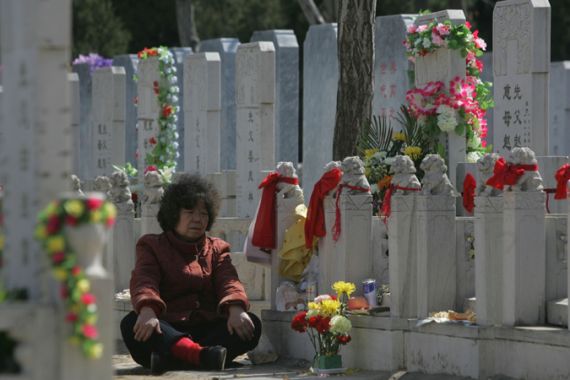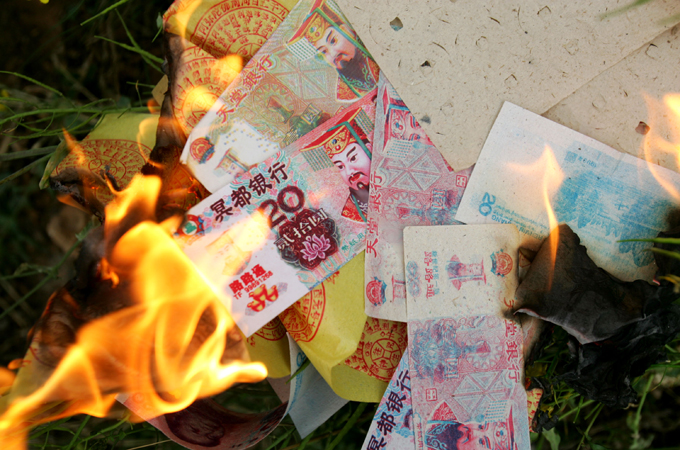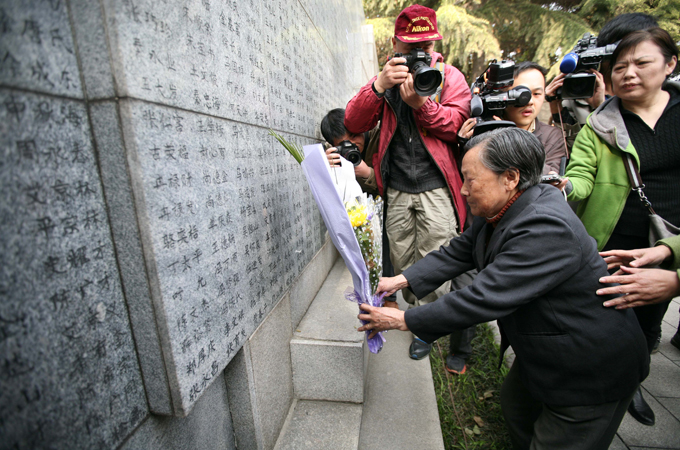Grave outcry on China’s Tomb Sweeping Day
Ancient tradition of honouring dead relatives is marred after millions of tombs were razed or disrupted by officials.

Zhoukou, China – Liu Buchen recalls clearly the panicked phone call he said he received from his uncle in August 2012 as the heat sweltered in his hometown Zhoukou, 250km away.
Liu’s uncle was sweating for another reason: In a bid to reclaim farmland, he said the local government had ordered him to flatten the sacred tomb containing the remains of family members buried there for generations. Buchen said authorities gave his uncle a deadline of 6pm to transfer the tomb elsewhere or it would be razed by bulldozers
“Police cars were patrolling everywhere around the village,” Liu recalled to Al Jazeera from a coffee shop in Zhengzhou, capital of Henan province, where he works in the retail business.
“If we did not flatten the tomb, local officials would hit us or demolish the graves themselves and give us a hefty fine,” he said. “You can tear down my house, but you cannot erase the tomb where both my parents and my grandparents rest.”
|
“The tomb-clearing campaign is both illegal and unfair … The local government should have dealt with the issue without forcing people.“ – Zhao Keluo, former Henan official |
April 4 is Tomb Sweeping Day in China, also known as the Qingming festival, when millions of Chinese return from major cities to their hometowns and show respect to their ancestors – a moral and spiritual obligation in Chinese culture. Qingming means purity, peace and civilisation in Chinese language.
Following the 2,500-year-old tradition, families typically gather around graves in the early morning to burn fake bank notes and incense, and present flowers and bowls of fresh fruit so the deceased have everything they need in the afterlife.
About 520m people visited their ancestors’ tombs during the 2012 holiday, according to the Ministry of Civil Affairs.
After the urgent phone call from his uncle, Liu returned to Zhoukou and flattened his family’s tomb. He was not able to make the trip back home to Zhoukou this year, but said he was relieved to know his uncle was able to honour his elders as tradition dictates.
Liu managed to rebuild the grave a couple of months ago after the tomb-flattening campaign generated massive opposition across China. All the burial plots in his village have now been restored, he said.
“But not those all along the main roads, because otherwise local officials would have lost face,” he said.
Tomb-flattening plans
About three million tombs were destroyed since March 2012 across Zhoukou, said Zhao Keluo, a former official from the Henan Consultative Conference, a political body where he had worked for five years.
But the local government’s initial goal was much bigger: to clear all the graves that dot the province’s rural landscape by the end of 2013, in order to reclaim 18 million square metres of arable land for food production.
 |
| Fake bills are burned by villagers to pay homage [Getty Images] |
“Of course, this will never be achieved because people got very, very angry,” Zhao told Al Jazeera.
Last December, Zhao was expelled from his position after leaking online a list of more than 100 high-level officials who, like him, were allowed to leave family tombs where they stood, while others were being forcibly flattened or relocated to newly built public cemeteries.
“The tomb-clearing campaign is both illegal and unfair … The local government should have dealt with the issue without forcing people,” said Zhao, a now-popular figure after he rallied public support via his microblog on Tencent Weibo, a Twitter-like service, where he has 230,000 followers.
China’s breadbasket
Located in the middle of the country, Henan is a rural area and one China’s poorest provinces. Although Henan is considered by historians as the cradle of ancient Chinese civilisation, today many Chinese look down on the province.
Henan is increasingly known for its illegal production of fake bank notes that circulate nationwide, its “cancer villages” where the disease proliferates allegedly linked to industrial pollutants, and its countless food-safety scandals.
Home of more than 90 million people, Henan relies mostly on agriculture as it produces large amounts of wheat, soybean and corn. Despite its low-paced economic development, Henan is critical to China, a country that has to feed the world’s largest population with only 15 percent of the world’s arable land.
Local authorities had said it was imperative to take over people’s land and turn it into farming areas to produce food.
They also said they would offer compensation and spots in public cemeteries, but Liu said he never received any money. Many of the new public cemeteries in Zhoukou are still empty because they’re too expensive for local villagers, who still prefer to bury their ancestors directly in the fields, as tradition in Henan dictates.
|
“The local government must reflect on the farce that caused a tremendous stir last year and the fierce confrontation between government actions and public opinion.“ – China Daily commentary |
Many villagers and outspoken critics of the campaign interviewed in Henan said the land reclaimed from the demolished tombs would have been too small for large-scale agriculture. Most burial plots are only a couple of metres wide, and dispersed randomly across fields.
According to the state-run China Daily, about half the tombs have now been restored in Zhoukou’s Taikang county after the central government stepped in and outlawed the programme.
Phone calls to the Zhoukou Bureau of Civil Affairs seeking comment rang unanswered on Thursday.
Land grabs
Tomb-flattening policies in China were first implemented by Chairman Mao Zedong during the 1966-76 Cultural Revolution. At that time it was an attempt to modernise China and put people’s remains in formal cemeteries, but also an attack on the traditional social order.
In Henan in 2012, it didn’t take long for scepticism to turn into vocal opposition, as many started to suspect the campaign was in fact an attempt by local officials in Zhoukou to steal land and sell it for profit.
 |
| Qingming festival involves cleaning of tombs [Getty Images] |
In China, it is common for local governments to finance themselves by selling land to private developers, mostly for real estate projects.
After a rare petition signed by more than 100 intellectuals circulated online, the tomb-flattening campaign in Henan quickly became a nationwide story, with critical articles being published even in state-controlled news outlets.
“The local government must reflect on the farce that caused a tremendous stir last year and the fierce confrontation between government actions and public opinion,” said a commentary in the China Daily.
“The execution process was very rude. After the central authority stopped the local government from removing graves, none of the local officials apologised or took responsibility for it.“
Although many of the tombs have been rebuilt, Henan residents are still bitter about the destruction of their sacred family burial places, while others fear the “ridiculous campaign” – as Liu put it – could happen again.
Zhao said the incident may be an opportunity to draft better regulations over land use for grave sites. Burial spots should be considered strictly as private property, he said.
“I do not regret my choice [to speak out against the tomb-razing campaign],” Zhao said. “Quite to the contrary, I am very happy that I managed to get so much support from the media and netizens against the policy”.